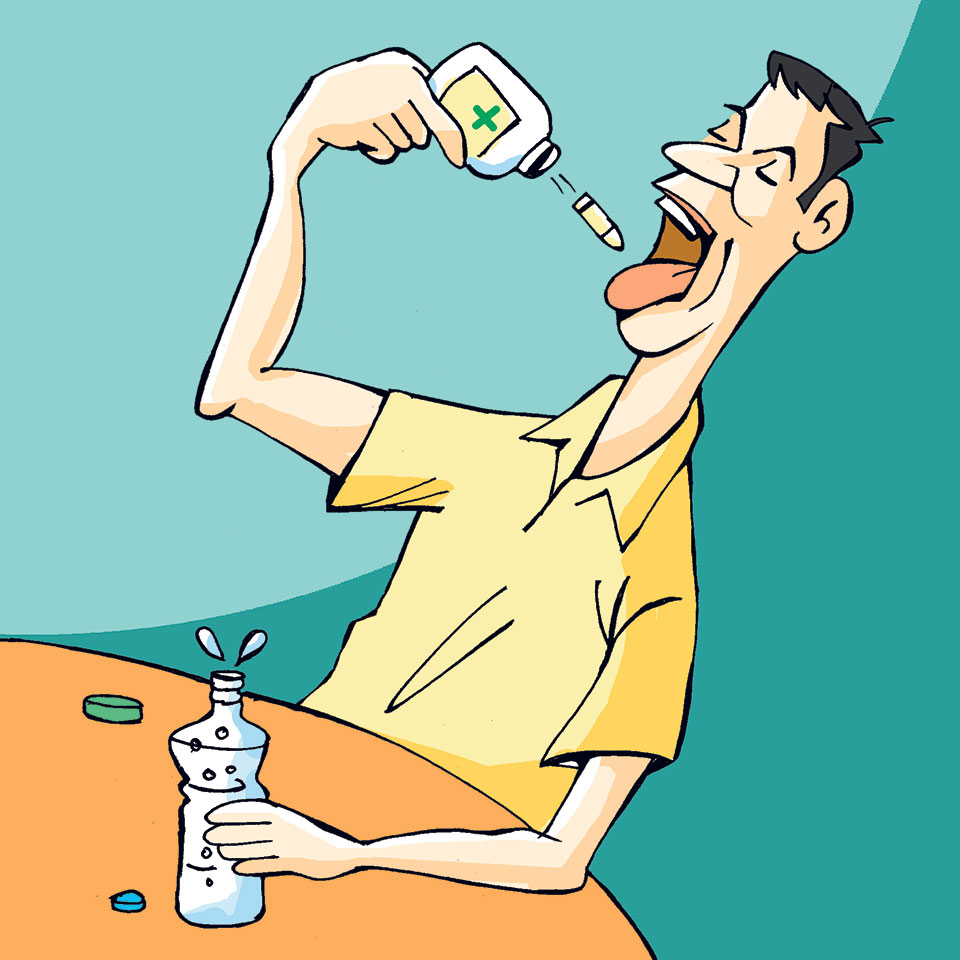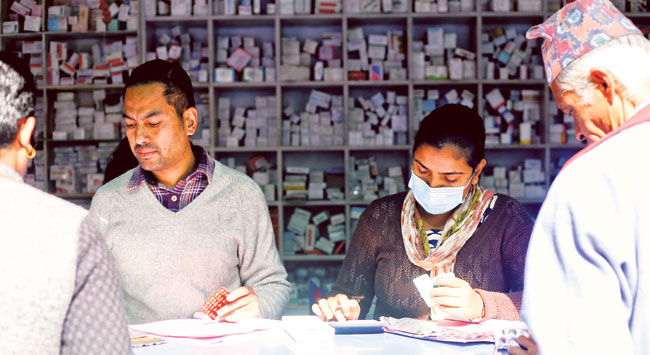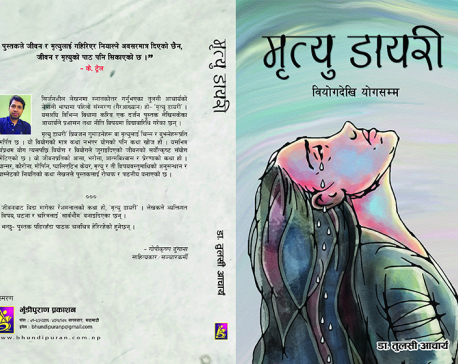
OR
cover story

There are usually some painkillers, cough syrups, antacids, and even antibiotics in a plastic box or a drawer somewhere in every household as it’s quite common for people to take medicines on their own at the slightest discomfort. This self-medicating habit, though helpful in providing immediate relief, isn’t a safe practice and has a lot of long term side-effects, from adverse reactions to risk of dependence. Cilla Khatry reports.
 The dangers of self-medication
The dangers of self-medication
She carries a tiny red pouch in her bag that she calls her ‘emergency medical kit’. Inside it, there are a couple of band aids, a vicks vaporub inhaler, and some sachets of antacids. But that’s not all. 33-year-old Rashmi Shrestha also has ibuprofen, a strip of paracetamol, and even the antibiotic ciprofloxacin. Shrestha feels aptly armed to tackle any minor health problem that might arise on a daily basis and often even gives the medicines to anyone complaining of a headache or malaise.
Shrestha isn’t the only one to do so. Out of a random sample of 15 people, nine had some sort of medicine in their bags, be it a blister pack of 400 mg flexon, a non-steroidal anti-inflammatory drug (NSAID), that one woman claimed to pop whenever she felt any sort of pain coming or medication for menstrual cramps that 24-year-old Sushreeti Thapa confessed to having at least one a day during her periods, despite her mother’s constant warnings not to do so.
Dr Pukar Thapa, general physician at Alka Hospital, Jawalakhel, says that though there are several benefits of self-medication like immediate relief for the patient and an active involvement of the patient in his or her own health care, it is far from being a completely safe practice. Some of the most common risks that self-medication pose are incorrect diagnosis, delay in seeking medical advice when needed, drug interactions and adverse reactions, and risk of dependence as one can become addicted to drugs such as antacids, cough syrups, and pain relievers.
“There is very little or almost no awareness about the disadvantages of self-medication,” says Dr Thapa who believes this practice can only be curtailed when patients and pharmacists both understand the implications of the seemingly harmless act of asking for and dispensing medications without a prescription.
It seems people throw caution to the wind when it comes to minor ailments because of two primary reasons: time and money. Consultations are time consuming, with doctors at many hospitals notorious for being late and keeping patients waiting for hours and those belonging to lower-income groups don’t want to spend unnecessarily on doctor’s fees when spending Rs 50 or less for an over the counter drug can take care of that fever or cough.
However, it seems people are a little more thoughtful when it comes to health matters of their children. Laxmi Tamang, 27, goes to a local pharmacy and takes over the counter drugs for everything for headaches to stomach cramps. But she takes her two sons – aged 11 and 3 – to Kathmandu Medical College and Teaching Hospital whenever they fall sick.
Dr Shankar Prasad Suri, MD in Pediatrics, says that the practice of self-medication is more harmful where children are concerned. The pediatrician has seen many cases where children come down with diarrhea, fever, or a bout of cough and cold, and parents often give them general medicines without consulting a doctor.
“Metronidazole is easily available over the counter and many just give it to their children when they have diarrhea because they know this will stop it. But test studies, carried out in mice and rats, have shown that the drug has cancerous effects and so it needs to be used with caution,” say Dr Suri adding that people often don’t know anything about the right dosage or the correct way to administer the medicine as well. “They also stop the medicine when the diarrhea stops and that way aren’t curing the problem. And so it will occur again and the child will be given the same drug once more,” he adds.
Dr Suri further explains that metronidazole is only given in cases when there are parasites or protozoans in the body and that can only be determined by a stool test. According to him, most children usually suffer from viral diarrhea in which case metronidazole is completely unnecessary. Similarly, cough and cold medicines have certain anti-allergens that can negatively affect the respiratory system in the long run and thus should be used sparingly. But many parents are guilty of pointlessly buying the strongest cough syrup for their children leading to resistance to other lesser potent but vital drugs as the child grows up.
“Any medicine you take can have long term ramifications. There are a lot of factors that you need to consider before popping a pill,” says Dr Suri. Taking medicines to treat symptoms without seeing a doctor could also mean that you are letting an underlying condition go undiagnosed, adds Dr Thapa. “There are symptoms like persistent fever and rash that could be associated with medical conditions that require proper diagnosis to be treated effectively,” he says.
Dr Thapa names the drug pantoprazole that is used to treat certain stomach and esophagus problems as the most abused medication. This drug is so commonly known that anyone with an upset stomach or a little pain in the abdominal region will first opt for this medicine. But stomachache could be a symptom of so many other conditions. “It could very well be a case of appendicitis in which case you need immediate medical help,” he explains.
When you take multiple medications on your own, you also run the risk of taking pills that should not be used together for safety reasons. Taking Sildenafil Citrate (commonly known as Viagra) when you are on heart medications can cause a sharp drop in blood pressure and trigger a heart attack. Some medications also affect the potency of other prescribed drugs when taken together. And indiscriminate use of antibiotics could lead to antimicrobial resistance. “The same medication may become ineffective when taken in the future,” says Dr Thapa adding that you are giving birth to new resistant organisms every time you abuse antibiotics.
And this is where doctor’s advice is of paramount important. Despite the internet being flooded with every kind of information you might need, Dr Suri says that’s just theoretical knowledge and it cannot be a substitute for diagnosis based on experience that comes from years of practice. “The information you find on the internet is generic and every human body is different,” he says explaining that symptoms may diminish temporarily with self-medication, but it will become difficult for a doctor to correctly diagnose and treat you later on when the condition gets worse.
However, people aren’t easily convinced. Tamang, who routinely takes painkillers without ever having consulted a doctor, says that you often know if what is plaguing you is serious or simply popping a pill will do. When questioned why the same logic doesn’t apply to her children, she says children are sensitive and parents need to be vigilant.
Expert’s take on how this harmful practice can be curbed
Every doctor should caution every patient who comes to him/her against self-medication.
Pharmacists should be made aware about the dangers of self-medication and prohibited from unnecessarily dispensing medicines.
Awareness programs should be carried out in every community during official events, health camps, and blood donation programs.
Here Dr Suri says that though children are a lot more vulnerable to the side-effects of self-medication, where one’s health is concerned everyone should exercise a little caution. Dr Thapa too agrees and gives an example of a friend who was diagnosed with end stage renal failure. Being a medical student, she would simply take oral or injectable diclofenac, a NSAID, when she was in any sort of pain and that ultimately led to her condition. Even paracetamol, the most common drug bought over the counter without prescription, is proven to cause kidney damage if taken for a long period.
But medicines have become a staple in every household with people becoming their own doctor unless it’s apparent that whatever is ailing them isn’t going away. By then, experts reason that you have already done a lot of harm to your body and it will be a major hassle to set things right, if it can be fixed at all.
“You should only take painkillers or other over the counter drugs if you have no access to health posts or hospitals, like in instances when you are on a trek in remote areas of Nepal. In every other case, you must consult a doctor,” concludes Dr Thapa.
cillakhatry@gmail.com
You May Like This

Life is never too pointless to be ended
"Priye Sufi," a book by Nepali author Subin Bhattarai, is a moving and consoling book. The story's primary lesson is... Read More...

'ULFA: The Mirage of Dawn’ offers a remarkably balanced narration on history of ULFA
Rajeev Bhattacharyya’s book offers a remarkable history of ULFA, its formation and rise to prominence, the interplay of its principal... Read More...

Mrityu Diary: A must read book about life and death
"Mrityu Diary" or the “Death Diary” is a book written by the author Tulasi Acharya, which is currently available in... Read More...





Just In
- NRB introduces cautiously flexible measures to address ongoing slowdown in various economic sectors
- Forced Covid-19 cremations: is it too late for redemption?
- NRB to provide collateral-free loans to foreign employment seekers
- NEB to publish Grade 12 results next week
- Body handover begins; Relatives remain dissatisfied with insurance, compensation amount
- NC defers its plan to join Koshi govt
- NRB to review microfinance loan interest rate
- 134 dead in floods and landslides since onset of monsoon this year












Leave A Comment